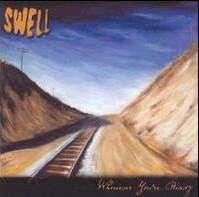|
Frustrating?
Despite it all, Freel seems downright understanding about Kirkpatrick's
ever-shifting priorities. So much, in fact, that after recording
the last couple Swell CDs without him, Freel welcomed Kirkpatrick
back for Whenever You're Ready, even bending over backwards
to overcome a geographic hurdle.
"I was in Milwaukee
and Chicago for awhile and I sent Sean some tapes," Freel said,
explaining how the new album came together. "He said he wanted
to work again, so I came back to California and stayed in San Francisco.
He lives in Santa Barbara, a scene that's too mellow for me."
The 300-miles separation
forced Freel to drive down the coast to record the drum parts in
Kirkpatrick's garage. "We tried doing it by tape, but that
didn't work. I had to go down there and explain how the parts came
together," Freel said. "All he does is the drum parts;
that's it. We discuss them in depth all the way through the process.
Aesthetically, the situation worked out between us."
There was a happy byproduct
to the separation. Freel says he and Kirkpatrick both were influenced
by the constant travel along Highway 101 -- a drive that rambles
back and forth between the ocean, dry rolling hills, old missions,
vineyards and some forgotten little towns. The product of two years
of recording in five locations is a classic road trip album soaked
in the color of a California sunset.
Standout tracks include
the haunting "Next to Nothing" that syncs Freel's pounding
acoustic strumming with Kirkpatrick's loose, scattershot drums and
a forlorn, echoing keyboard line. That acoustic guitar-and-drums
combination is the backbone behind Swell's sound, a laid-back beachnut
vibe that would be right at home next to a camp fire or breaking
surf. At the same time, there's a lush, film noir shadow that haunts
their music, making it feel like a soundtrack to an edgy indie movie.
Even when Freel brings on the electric guitars, the impact is more
transcendental than heavy.
"To me, the album
sort of distills the other six records we've recorded. It's a 'greatest
moods' album," Freel said. Clocking in at around 66 minutes,
that's a lot of moods. Did the band include so much material because
they knew this could be their finale?
"I always feel that
way about every record, that it could be the last one," Freel
said. "And that's how I approach them. It explains why it's
so long. We kept finding songs we wanted to work on, and kept putting
them on there. We thought about cutting it, but figured, 'fuck it.'"
|

|
"To
me, the album sort of distills the other six records we've
recorded. It's a 'greatest moods' album."
|
|
|
